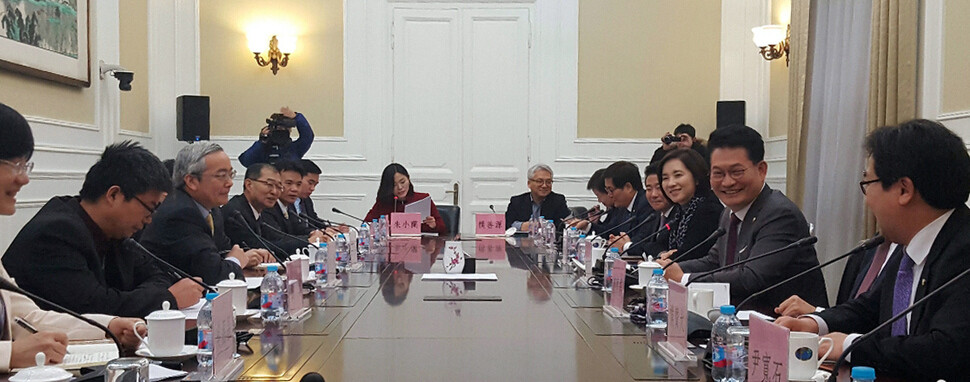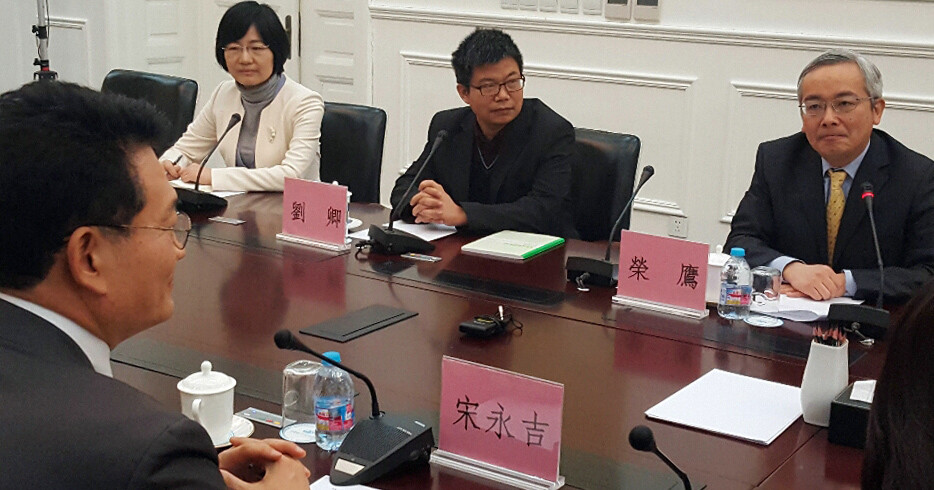hankyoreh
Links to other country sites 다른 나라 사이트 링크
[News analysis] China and “adjusting the speed” of THAAD deployment

While the Chinese government reconfirmed its opposition to deploying the THAAD missile defense system in South Korea during a meeting with Minjoo Party lawmakers who were visiting Beijing, attention is turning to a subtle shift in attitude revealed by China’s request for “an adjustment of speed.”
During a meeting with a delegation of seven lawmakers from the Minjoo Party on Jan. 4, Chinese Foreign Minister Wang Yi reportedly said that the two countries could “continue expanding exchange from the perspective of mutual understanding if [South Korea] freezes the THAAD deployment acceleration process.” While it would be a stretch to infer that this represents a shift in China’s opposition to THAAD, there is something new here: the concept of “acceleration,” which has never been directly mentioned by the South Korean government.
Wang’s remarks could be interpreted as meaning that China hopes to slow down the THAAD deployment for now with the hope that there will be a policy change under South Korea’s next government. China’s strategic calculation appears to be that this would forestall the “worst-case scenario” of THAAD being deployed before the end of the administration of President Park Geun-hye. China also appears to prefer negotiating the issue with the next South Korean government, on the assumption that an early election will put the political opposition in power, which appears to be quite likely at present.
Wang’s remarks are also a warning about the consequences that could result if South Korea deliberately hastens the THAAD deployment. “China is well aware that South Korea cannot unilaterally repeal an agreement made with the US, but we understood this to mean that China expects us to take steps to adequately relieve concerns about violating China’s security interests during the deployment process,” said lawmaker Song Yeong-gil, who attended the meeting with Wang on Jan. 4.

Some think that China would be willing to negotiate its response if deliberations were held at a later point. In contrast, China might be even more provoked (given its emphasis on stability at home and abroad before the 19th National Congress of the Communist Party this fall and the change of leadership) if South Korea moves ahead with the THAAD deployment this year.
A third interpretation is that China is sending the signal that it is possible to “expand exchange” as long as South Korea demonstrates its “sincerity” by ending the “acceleration.”
“The feeling of 'restriction' that South Korea has is real but it is not government-led; it's Chinese people's spontaneous behavior,” said Lü Chao, an analyst researching Korean Peninsula affairs at the Liaoning Academy of Social Sciences. Lü’s remarks, which were quoted in China’s Global Times, suggest that the Chinese government is not behind the push to restrict South Korean cultural products and tourism (though this is thought to be retribution for THAAD) and that South Korea should therefore make the first move.
But considering that the Park administration and the South Korean military have been clamoring to move forward with the THAAD deployment as planned, with the Defense Ministry assessing the value of the deployment site even while Park was being impeached last year, they are unlikely to take a positive view of China’s calls for “freezing the acceleration process,” which would mean interrupting the deployment.
In related news, South Korean Deputy Foreign Minister Kim Hyoung-zhin reportedly summoned Chinese Ambassador to South Korea Qiu Guohong to the Foreign Ministry on the morning of Jan. 5 to express “regret” for remarks made by Chen Hai, deputy director general at the Chinese Foreign Ministry‘s Department of Asian Affairs. Chen used intimidating language in a meeting with South Korean corporate executives while he was visiting South Korea at the end of 2016, threatening that China would take measures that would come close to breaking off diplomatic ties if South Korea deployed THAAD.
By Kim Oi-hyun, Beijing correspondent and Lee Je-hun, staff reporter
Please direct questions or comments to [english@hani.co.kr]

Editorial・opinion
![[Column] Has Korea, too, crossed the Rubicon on China? [Column] Has Korea, too, crossed the Rubicon on China?](https://flexible.img.hani.co.kr/flexible/normal/500/300/imgdb/original/2024/0419/9317135153409185.jpg) [Column] Has Korea, too, crossed the Rubicon on China?
[Column] Has Korea, too, crossed the Rubicon on China?![[Correspondent’s column] In Japan’s alliance with US, echoes of its past alliances with UK [Correspondent’s column] In Japan’s alliance with US, echoes of its past alliances with UK](https://flexible.img.hani.co.kr/flexible/normal/500/300/imgdb/original/2024/0419/2317135166563519.jpg) [Correspondent’s column] In Japan’s alliance with US, echoes of its past alliances with UK
[Correspondent’s column] In Japan’s alliance with US, echoes of its past alliances with UK- [Editorial] Does Yoon think the Korean public is wrong?
- [Editorial] As it bolsters its alliance with US, Japan must be accountable for past
- [Guest essay] Amending the Constitution is Yoon’s key to leaving office in public’s good graces
- [Editorial] 10 years on, lessons of Sewol tragedy must never be forgotten
- [Column] A death blow to Korea’s prosecutor politics
- [Correspondent’s column] The US and the end of Japanese pacifism
- [Guest essay] How Korea turned its trainee doctors into monsters
- [Guest essay] As someone who helped forge Seoul-Moscow ties, their status today troubles me
Most viewed articles
- 1[Column] The clock is ticking for Korea’s first lady
- 2After 2 months of delayed, denied medical care, Koreans worry worst may be yet to come
- 3Samsung barricades office as unionized workers strike for better conditions
- 4[Column] Has Korea, too, crossed the Rubicon on China?
- 5All eyes on Xiaomi after it pulls off EV that Apple couldn’t
- 6[Correspondent’s column] In Japan’s alliance with US, echoes of its past alliances with UK
- 7US overtakes China as Korea’s top export market, prompting trade sanction jitters
- 8Hong Se-hwa, voice for tolerance whose memoir of exile touched a chord, dies at 76
- 9[Photo] Smile ambassador, you’re on camera
- 10[Editorial] When the choice is kids or career, Korea will never overcome birth rate woes